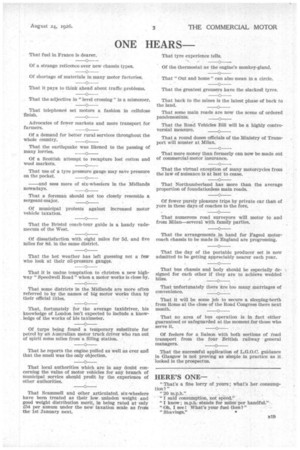ONE HEARS
Page 37

If you've noticed an error in this article please click here to report it so we can fix it.
'That fuel in France is dearer.
Of a strange reticence over new chassis types.
Of shortage of materials in many motor factories.
That it pays to think ahead about traffic .problems.
That the adjective in "level crossing" is a misnomer.
That telephones set motors a fashion in cellulose finish. 0 Advocates of fewer markets and more transport for farmers. 0 Of a demand for better rural services throughout the whole country. 0 That the earthquake was likened to the passing of many lorries. 0 Of a Scottish attempt to recapture lost cotton and wool markets. 0 That use of a tyre pressure gauge may save pressure on the pocket. 0 —and sees more of six-wheelers in the Midlands nowadays.
That a foreman should not too closely resemble a sergeant-major. 0 Of municipal protests against increased motor vehicle taxation.
That the Bristol coach-tour guide is a handy vademecum of the West.
Of dissatisfaction with eight miles for 5d. and five miles for 8d. in the same district.
That the hot weather has left guessing not a few who look at their oil-pressure gauges.
That it is undue temptation to christen a new highway " Speedwell Road " when a motor works is close by.
• That some districts in the Midlands are more often referred to by the names of big motor works than by their official titles.
That, fortunately for the average taxidriver, his knowledge of London isn't expected to include a know • ledge of the works of his taximeter.
Of turps being found a temporary substitute for petrol by an Australian motor truck driver who ran out of spirit some miles from a filling station.
That he reports the engine pulled as well as ever and that the smell was the only objection.
That local authorities which are in any doubt concerning the value of motor vehicles for any branch of municipal service should profit by the experience of other authorities.
That Scammell and other articulated, six-wheelers have been treated as their low unladen weight and good weight distribution merit, in being rated at only £54 per annum under the new taxation scale as from the 1st January next. That tyre experience tells.
Of the thermostat as the engine's monkey-gland.
That "Out and home" can also mean in a circle.
That the greatest grousers have the slackest tyres.
That back to the mines is the latest phase of back to the land. 0 That some main roads are now the scene of ordered pandemonium. 0 That the Road Vehicles Bill will be a highly contro versial measure. 0 That a round dozen officials of the Ministry of Transport will muster at Milan.
That more money than formerly can now be made out of commercial-motor insurance.
That the virtual exception of many motorcycles from the law of nuisance is at last to cease.
That Northumberland has more than the average proportion of foundationless main roads.
Of fewer purely pleasure trips by private car than of yore in these days of coaches to the fore.
That numerous road surveyors will motor to and from Milan—several with family parties.
That the arrangements in hand for Fageol motorcoach chassis to be made in England are progressing.
That the day of the portable producer set is now admitted to be getting appreciably nearer each year.
That bus chassis and body should be especially designed for each other if they are to achieve wedded bliss. 0 That unfortunately there are too many marriages of convenience. 0 That it will be some job to secure a sleeping-berth from Rome at the close of the Road Congress there next month. 0 That no area of bus operation is in fact either guaranteed or safeguarded at the moment for those who serve it. 0 Of feelers for a liaison with both sections of road transport from the four British railway general managers. 0 That the successful application of L.G.O.C. guidance in Glasgow is not proving as simple in practice as it looked in the prospectus.




































































































